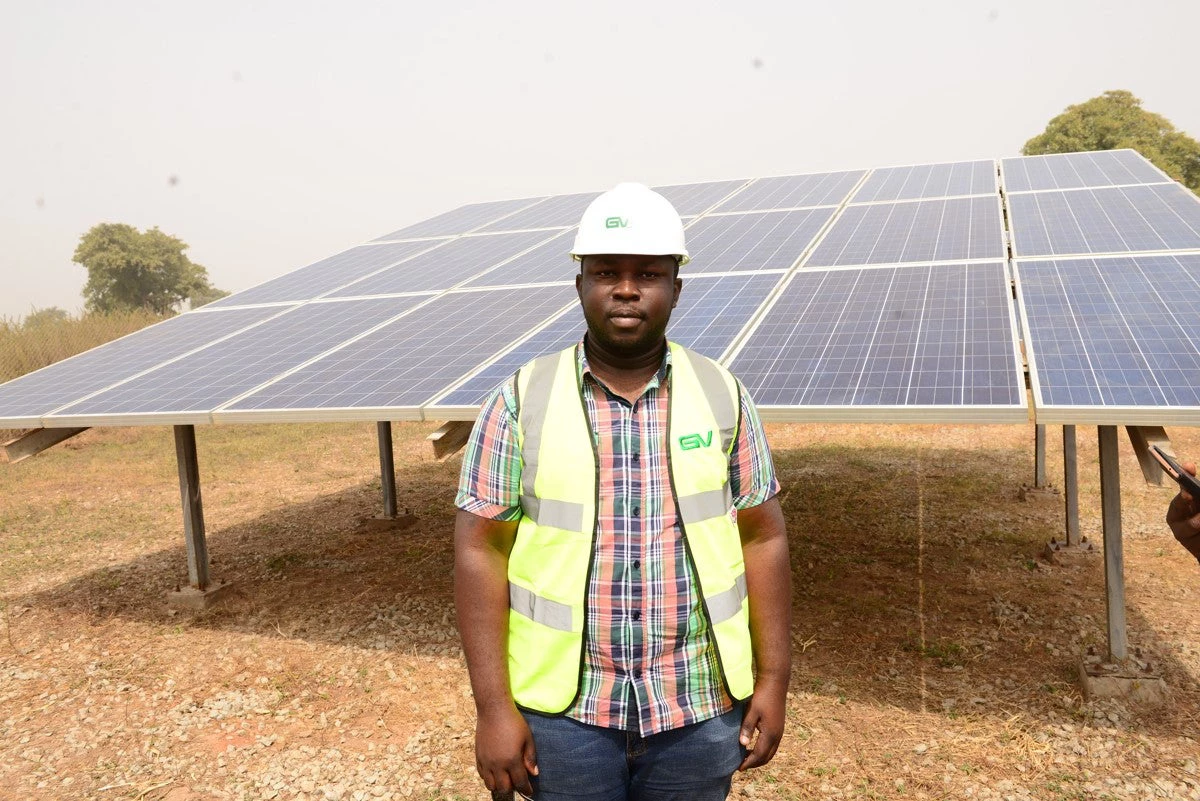
In their 20s, they are the co-founders of Green Village Electricity (GVE) Projects Limited —a company that has been providing electricity access to remote and rural parts of Nigeria through solar photo voltaic (PV) solar mini grids since 2012.
The trio began their journey in 2006 while they were interns at Shell Petroleum Company in the Niger Delta. Their work took them to remote villages, where people still lived without electricity access, despite being in an oil-rich region. These communities relied on kerosene lamps and candles for light and had to go to the village market to charge their mobile phones.
Orajaka, Eze and Onyekwelu felt compelled to change this. Today, their company GVE has 40 employees and serves 5,800 households through their various mini-grid projects. They aim to install over 200 mini grids by 2020.
Our team had an opportunity to meet these young entrepreneurs during a visit to the village of Bisanti, which has a solar mini grid installed by GVE. With a population of just 200 households (or about 1600 people), Bisanti’s economy largely depends on farming and running small convenience stores. Until a couple of years ago, only a handful of these households had access to electricity - but even that was through petrol-powered generators. A majority were dependent on kerosene lamps, candles and firewood. Lack of electricity was hurting residential and commercial activities, especially the processing of agro-products such as maize and cassava.
The villagers had no idea that the sun, which beat down on their roofs every day could actually be used as an energy source that could transform the way they lived and worked. That’s when GVE stepped in.
In 2015, GVE installed a 40 kWp solar mini-grid pilot project in collaboration with the Bank of Industry Nigeria (BOI)/United Nations Development Program (UNDP) and the Institute of Electrical Electronics Engineers (IEEE) in Bisanti. Utilizing a pay-as-you-go platform, the project provides electricity to all 200 households in the community. It helps keep streetlights on along the main street of the village, which ensures safety for women and children, while shops and businesses stay open longer. The project also focuses on capacity building by training locals to oversee the daily operation of the site.

The success of GVE’s mini grid projects in villages like Bisanti is powering Nigeria’s progress toward universal energy access by 2030. To support this goal, the country is also taking steps to ensure it provides comprehensive regulations and an enabling environment for mini grid developers.
The Nigerian Rural Electrification Agency (REA) is playing a key role in this transformation. Through a 5-year Nigeria Electrification Project (NEP) that utilizes a $350 million loan from the World Bank, REA will support the development of mini-grid projects by the private sector, serving at least 300,000 households and 30,000 local enterprises in close to 10,000 communities.
The emergent mini grid sector in Nigeria is poised to grow rapidly with at least 7 domestic companies other than GVE developing mini grids that represent a pipeline of over 1,000 projects. Local companies with large power requirements, such as those providing telecom and agricultural services, are also expected to be prospective mini grid developers. International mini grid companies like Husk Power and Powerhive and global conglomerates like GE, ABB, Siemens, Schneider Electric are also exploring the the potential for mini grids in Nigeria.
REA has also launched an initiative called “Energizing Economies” that promotes mini-grid development in areas that have the potential to bolster the country’s economy with the right infrastructure and are chosen based on the level of commercial activity and their role in increasing local production of goods, which point to a high demand for electricity.
[[avp asset="/content/dam/videos/ecrgp/2018/jun-18/rea_updated_high_-_large.flv"]]/content/dam/videos/ecrgp/2018/jun-18/rea_updated_high_-_large.flv[[/avp]] (Video courtesy: REA)
Supported by the World Bank, Nigeria is paving the way for the energy access transformation and scale up of mini grids as a low cost and timely solution. The progressive mini grid policies and cost reflective tariffs adopted by the Nigerian government will not only be helpful for companies such as GVE in expanding their business but will also set an example for the other Sub Saharan countries.
The visit to Bisanti was part of an Action Learning Event on Upscaling Mini Grids in Abuja organized by the World Bank’s Energy Sector Management Assistance program (ESMAP) in December 2017.



Join the Conversation